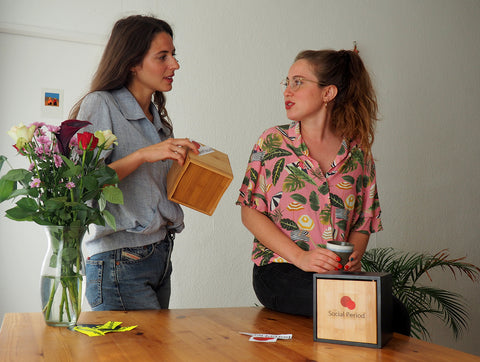Social Period offers a solution to the problem of period poverty by placing donation boxes in public places such as supermarkets, drugstores, cafés and coworking spaces to simplify the process of donating menstrual products for individuals. We pick up the donations and pass them on to social institutions, such as emergency shelters for the homeless, women’s shelters and recently, schools.
Who’s the soul behind Social Period?
My name is Tatjana Kunz, I am a feminist interested in social issues, the reason why I wanted to get involved straight away when my friends told me about Social Period.
My best friends, Katja Dill and Undine, Mothes came up with an idea of fighting period poverty after Katja was first confronted with the topic of period poverty through a seminar at university in 2019. Many discussions with various organizations like the “STRASSENFEGER e.V.’ in Berlin confirmed the need for menstrual products in general and a project like Social Period specifically and that’s how they founded Social Period in January of this year.

Period poverty is everywhere
Period poverty is essentially the issue of individuals not having access to basic health products to care for one‘s menstruation. The causes, however, vary. A reason can be the lack of information and simply not knowing how to use certain menstrual products or not having access to them due to their financial situation. Especially affected by this phenomenon are vulnerable groups of our society such as homeless people. Homeless people often face a lot of stigmatisation and indifference in our society, which is why it is important to realise that many homeless people menstruate.
However, the longer we have worked on this project, the more we have realised that the problem concerns an even wider range of groups of vulnerable individuals. Period poverty has many faces in Germany. It can affect people dealing with financial and/or personal emergencies, who may have a home or shelter but do not have the money to provide menstrual products for themselves or family members every month or will have to endure certain sacrifices that may affect their health and well-being.
It has become evident to us that this is the reality for a lot of people when talking to managers of women’s shelters and teachers in schools as well. Though recently, there has been more awareness raised for this topic e.g. through the work of activists Nanna-Josephine Roloff and Yasemin Kotra who successfully fought Germany’s luxury tax on all sanitary products.The fact is that the topic of menstruation is still unfortunately highly stigmatised in Germany.
How menstrual management is handled in the streets?
We know that menstrual management, when you live on the street, can be quite difficult. If people do not have access to secure menstrual products, they have to fall back on alternatives such as leaving a tampon in for a longer time than is recommended, using socks or even old newspapers.
This is not the safest way to care for your period as it can cause bacterial infections or maybe even worse – cause a toxic shock which can result in severe circulatory and organ failure. I have to add that there are wonderful institutions such as emergency shelters, that give homeless people the opportunity to have a shower and use the toilet in private, but I imagine it to be a different sensation to enjoying the privacy of your own home. Apart from the lack of resources, spontaneous availability also plays a role.
How does someone who is homeless spontaneously get access to period products?

Menstruation has become a private affair, even though it regularly affects billions of people. Concerning homeless people, when you are stigmatised day after day, do you dare to potentially be stigmatised even more for asking for period products? I think it is comprehensible that groups of people who are already stigmatised are uncomfortable with asking for period products. It is important to understand why the topic is so sensitive before trying to solve it.
Society does not allow periods to be public and neither does it grant everyone the setting needed to manage periods in private. Thus, privacy and intimacy have, unfortunately, become a privilege not everyone has access to.
How much does a period cost?, Is it affordable for everyone?
According to a study, women menstruate on average about 500 times over the course of their lives and spend an average of 21.000€ on it.
This particular study does not only include an individual’s spending on menstrual products but also on medicine, certain foods and underwear. It is also important to mention that the menstrual cycle is very individual and thus, should never be generalized, some people menstruate more often, some do less, some people have a heavy flow, others do not, but these figures give cause for calculation and important questions, like: How much will my health and well-being suffer if I can only afford half of that amount? What do I prioritize? Do I not deserve to have a pain-free or safe menstruation if I cannot afford it? Why do many people who menstruate have to bear the financial responsibility alone?
Menstruation is not a luxury

Are periods political?
They definitely are. Nearly half of our population menstruates at some point of their life.
Periods cost money, can affect the well-being of an individual or their level of education. Companies pull a financial gain out of the fact that people menstruate, they affect the environment, our economy.
Throughout history, human bodies and especially female* bodies have been shamed and stigmatized for their natural function to menstruate. Periods have been and are still sometimes considered to be dirty and shameful which as a result leads to people that menstruate being considered “unclean”.
This narrative is dangerous. According to article 11 of the UN Social Pact, everyone has the right to an adequate standard of living. To us, this includes the right to safely menstruate. Because this is not given at this moment in time, it has to be political until the situation has changed.

If women look for quality products to manage their period, shouldn't all women have the same right regardless of their income?
We definitely believe so which is why we petition that period products become freely available in public institutions in Germany. We saw that Scotland recently made period products freely available to all who need them and decided to follow their example. We do not think that income should decide who can manage their period and who cannot.
If you agree with us, please consider signing our petition.
Why did you choose to donate menstrual cups this time?
We are aware of the fact that periods can create a lot of waste which is why we were looking for alternatives. I personally have switched to a cup and now use it about 80% of my period and consider it a great, sustainable and ultimately, cost-effective solution. However, because cups are reusable you need to have access to water to clean them, which is not always possible if you live on the streets.
They are, one of the greatest products to fight period poverty as they last for years (if taken good care of) and you will only need one, as long as you do have access to clean water every day.
This is why we really wanted to spread awareness about cups and donate them to people in need. We are donating them to people temporarily living in women’s shelters, so, to individuals who do not have a permanent home right now but do have shelter, and to schools.

Tell us a lesson you have learned from Social Period
Being involved with Social Period has definitely taught me humility and I’ve become less cynical about the state of our society. Seeing the overwhelmingly positive responses from people who wanted to join Social Period, and also realizing how many products were so kindly donated, made me realize that there are a lot of people who do care about this topic.
Because the topic is so political, it is brilliant to see that so many want to make our society a little bit more inclusive and solve this problem with us.

How can we help?
We are so grateful that so many people asked to get involved after hearing about Social Period in the press or on Social Media.
Feel free to email us or drop us a DM on Instagram if you want to help. We are also always excited when we receive donations which you can also sent via our amazon wishlist, if you do not live close to one of our boxes.
We also have another donation campaign running right now to help us fund the production of new donation boxes, you can find the campaign here.
 Your Account
Einloggen
Your Account
Einloggen
 Basket
Basket

